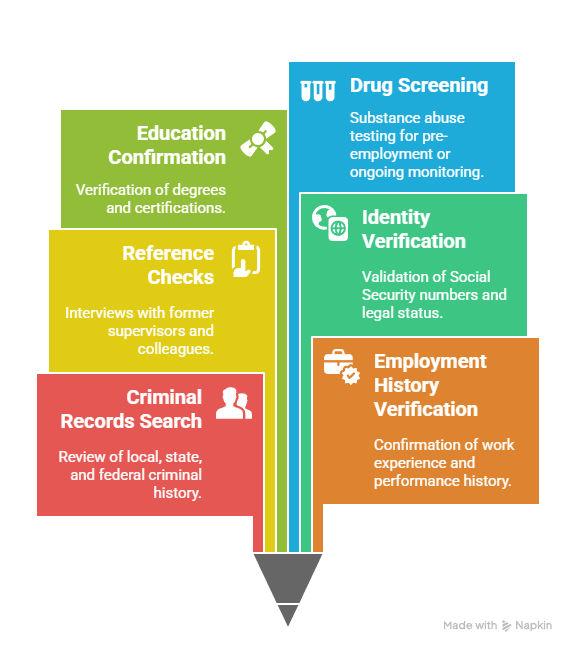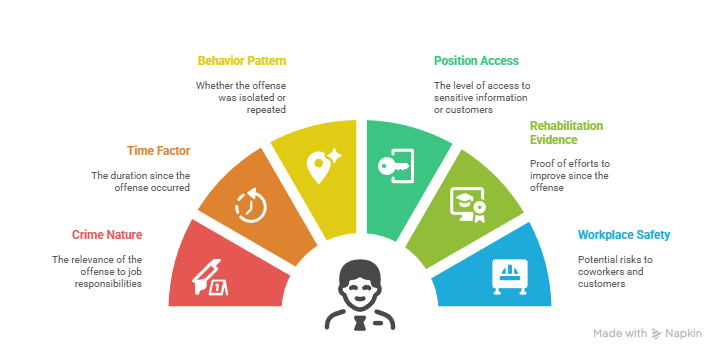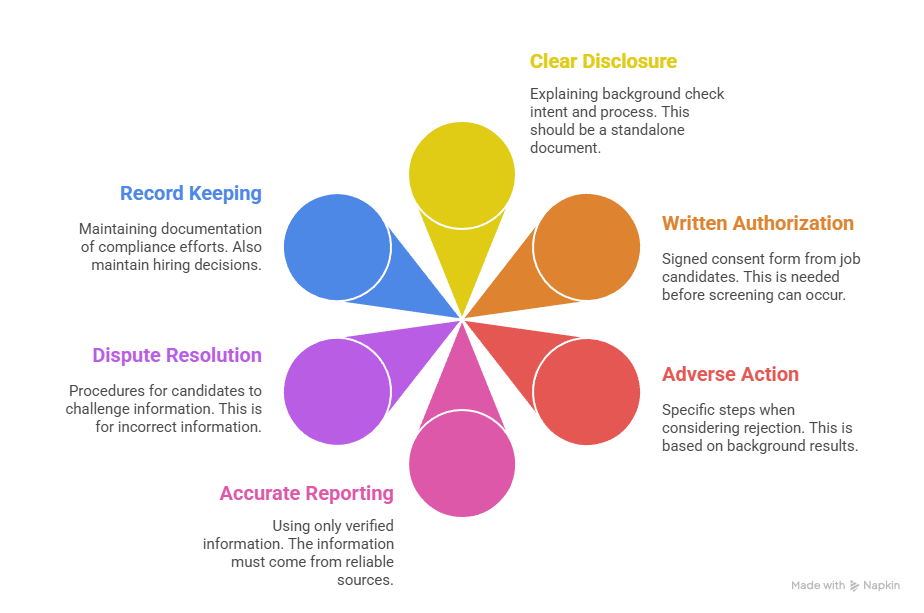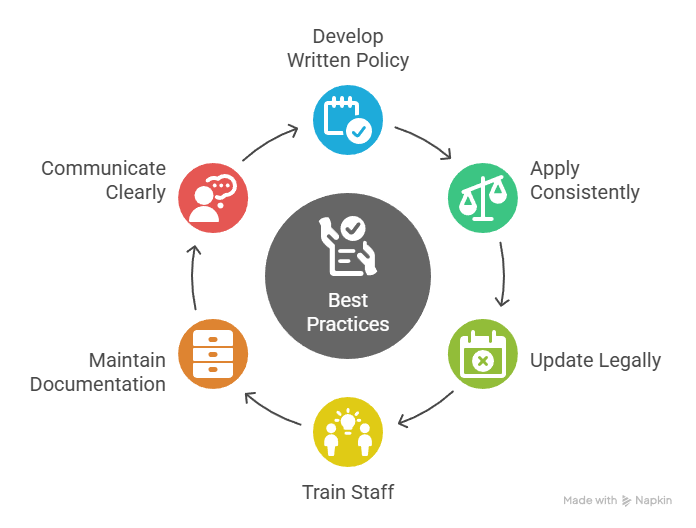Texas retail employers must follow state and federal laws when conducting background checks on potential workers. These regulations include ban the box requirements and Fair Credit Reporting Act compliance to protect both businesses and job seekers.
Key Takeaways
- Texas does not mandate specific background checks for retail positions, but employers can conduct screening following legal guidelines.
- The state's ban the box law prevents employers from asking about criminal history on job applications.
- Employers must wait until after interviews or conditional job offers before checking criminal backgrounds.
- Any criminal history must directly relate to the job duties to justify hiring decisions.
- Third-party background checks require written disclosure and candidate consent under federal FCRA rules.
- Most Texas retail background checks complete within 1-5 business days depending on screening scope.
Texas Legal Framework for Retail Background Checks
Texas operates under a flexible approach to retail background screening. The state allows employers to set their own policies within legal boundaries. This means retail businesses have discretion in choosing screening methods. However, they must comply with both state and federal regulations.
The Texas retail industry employs approximately 1.3 million workers statewide. These workers range from part-time sales associates to full-time managers. Each position may require different levels of screening based on responsibilities. Most major retailers conduct some form of background verification for new hires.
State law focuses on preventing discrimination rather than mandating specific checks. Employers cannot use blanket policies that automatically exclude candidates. Instead, they must evaluate each case individually. This protects workers while allowing businesses to make informed hiring decisions.
Understanding Ban the Box Requirements
Application Timing Restrictions
Texas Labor Code Chapter 411 creates important timing rules for criminal history inquiries. The law prohibits asking about criminal records on initial job applications. This applies to most retail employers across the state. The goal is giving candidates fair consideration based on qualifications first.
Retail employers must remove criminal history questions from job applications. They cannot ask about arrests, convictions, or pending charges initially. These restrictions apply to both paper and online application systems. Employers who violate these rules may face legal challenges.
The ban the box law allows criminal background inquiries only after specific hiring milestones. Employers can ask about criminal history after conducting in-person interviews. They can also make inquiries after extending conditional job offers. The timing depends on the employer's hiring process structure.
Interview and Offer Stage Requirements
| Hiring Stage | Criminal History Questions | Permitted Actions |
| Initial Application | Prohibited | Remove all criminal background questions |
| Phone Screening | Prohibited | Focus on skills and experience only |
| In-Person Interview | Allowed | May discuss relevant criminal history |
| Conditional Job Offer | Allowed | Can order comprehensive background checks |
These timing requirements help ensure fair evaluation of all candidates. Job seekers get opportunities to demonstrate their qualifications before criminal history review.
Types of Background Screening for Retail Workers
Texas retail employers use various screening methods based on position requirements. Criminal history checks remain the most common type of verification. Employment and education verification follow closely behind. The screening scope often matches the job's level of responsibility and access.
Common Retail Background Check Elements:

- Criminal Records Search: Local, state, and federal criminal history review
- Employment History Verification: Confirming previous work experience and performance
- Reference Checks: Speaking with former supervisors and colleagues
- Identity Verification: Confirming Social Security numbers and legal work status
- Education Confirmation: Verifying degrees or certifications when required
- Drug Screening: Pre-employment or ongoing substance abuse testing
Entry-level retail positions typically require basic screening packages. These include criminal history and employment verification. Higher responsibility roles may need more comprehensive checks. Management positions often undergo multi-state criminal searches and extensive reference verification.
Position-Based Screening Variations
Cash handling positions require enhanced financial crime screening. These roles include cashiers, customer service representatives, and supervisors. Employers focus on theft, fraud, and embezzlement history. Some companies also conduct credit checks when legally permitted and job-related.
Management and keyholder positions undergo the most thorough screening processes. These comprehensive checks include criminal history from multiple states. They also feature extensive employment verification and professional reference calls. The increased access and responsibility justify more detailed background investigation.
Criminal History Evaluation Standards
Direct Relationship Requirements
Texas law requires criminal history to directly relate to job duties. Employers cannot automatically reject candidates based on any criminal record. They must evaluate how specific crimes might affect job performance. This individualized assessment prevents blanket discrimination while protecting legitimate business interests.
Direct Relationship Assessment Factors:

- Crime Nature: How the offense relates to specific job responsibilities
- Time Factor: Years passed since conviction or completion of sentence
- Behavior Pattern: Single incident versus repeated criminal activity
- Position Access: Level of customer interaction, money handling, or sensitive information
- Rehabilitation Evidence: Education, employment, or treatment completed since conviction
- Workplace Safety: Potential risk to coworkers or customers
For example, a ten-year-old minor drug conviction may not relate to current retail sales work. However, recent theft charges might directly impact cash-handling positions. Employers must make these determinations based on factual job requirements.
Prohibited Discrimination Practices
Retail employers cannot use certain practices when evaluating criminal history. Automatic disqualification policies violate Texas employment law. These blanket exclusions prevent individualized assessment of candidates. Courts have ruled against employers who fail to consider rehabilitation and job-relatedness.
The Equal Employment Opportunity Commission provides guidance on fair criminal history use. Their recommendations help employers avoid discrimination claims. Best practices include written policies, consistent application, and documented decision-making processes.
Fair Credit Reporting Act Compliance
The Fair Credit Reporting Act creates federal requirements for background checks conducted by third parties. All Texas retail employers must follow FCRA rules when using screening companies. These regulations protect candidate rights and ensure accurate reporting. Violations can result in significant financial penalties and lawsuits.
FCRA Compliance Requirements:

- Clear Disclosure: Standalone document explaining background check intent and process
- Written Authorization: Signed consent form from job candidates before screening
- Adverse Action Process: Specific steps when considering rejection based on background results
- Accurate Reporting: Using only verified information from reliable sources
- Dispute Resolution: Procedures for candidates to challenge incorrect information
- Record Keeping: Maintaining documentation of compliance efforts and hiring decisions
The disclosure requirement means employers cannot hide background check notices in application materials. They must provide clear, separate documents that candidates can easily understand. This ensures informed consent before screening begins.
Adverse Action Procedures
When background checks reveal information that might lead to rejection, employers must follow adverse action procedures. This process gives candidates opportunities to review and dispute potentially incorrect information. It also ensures fair consideration before final hiring decisions.
The adverse action process starts with pre-adverse action notification. Employers must provide candidates with copies of background reports. They also must include consumer rights summaries explaining dispute options. Candidates then receive reasonable time to respond with corrections or explanations.
| Adverse Action Step | Timeline | Required Documents |
| Pre-Adverse Action Notice | Before final decision | Background report copy, consumer rights summary |
| Candidate Response Period | 3-5 business days typical | Opportunity to dispute or explain findings |
| Final Adverse Action Notice | After decision made | Final rejection notice, consumer rights information |
This process protects both employers and candidates by ensuring accurate information use in hiring decisions.
Background Check Processing and Timelines
Typical Processing Timeframes
Texas retail background checks usually complete within one to five business days. Processing speed depends on screening scope and verification methods. Basic criminal and employment checks finish fastest. Comprehensive packages with multiple components take longer to complete.
Criminal history searches vary by jurisdiction and record accessibility. County-level searches often complete within one to two business days. Statewide database searches typically finish within three business days. Federal criminal searches may take up to five business days depending on court systems.
Employment verification timelines depend on previous employer response rates. Some companies respond to verification requests within 24 hours. Others may take up to two weeks to provide employment confirmation. Automated verification systems speed up this process significantly.
Factors Affecting Processing Speed
Several factors influence background check completion times for Texas retail positions. Court system digitization affects criminal record search speed. Older jurisdictions with paper records take longer to process requests. Modern electronic systems provide much faster results.
Processing Speed Factors:
- Jurisdiction Technology: Electronic versus paper-based record systems
- Search Scope: Single county versus multi-state criminal history searches
- Verification Methods: Automated systems versus manual confirmation processes
- Previous Employer Cooperation: Response time for employment and reference checks
- Candidate Information Accuracy: Correct names, dates, and addresses speed verification
- Peak Hiring Periods: Holiday seasons and back-to-school times create backlogs
Retail employers can improve processing speed by providing accurate candidate information. They should also set realistic timeline expectations with hiring managers and candidates.
Cost Considerations for Retail Background Screening
Background check costs vary significantly based on screening package components. Basic criminal and employment verification typically costs $25-50 per candidate. Comprehensive packages with multiple verification types range from $75-150 per screening. Volume pricing often reduces per-check costs for larger retailers.
Cost Factors by Check Type:
- Basic Criminal Search: $15-30 for single jurisdiction
- Multi-State Criminal Search: $40-75 depending on states included
- Employment Verification: $10-25 per previous employer
- Education Verification: $15-35 per institution
- Professional Reference Checks: $20-40 per reference
- Drug Screening: $30-60 depending on panel type
Most retail employers find background screening costs justified by reduced turnover and theft prevention. The investment in proper screening often pays for itself through better hiring decisions and workplace safety improvements.
Budgeting and Volume Considerations
Large retail chains often negotiate volume discounts with background screening providers. These agreements can reduce per-check costs by 20-40% compared to individual screening purchases. Smaller retailers may benefit from industry association group buying programs.
Seasonal hiring patterns affect background screening budgets. Retailers preparing for holiday seasons need larger screening budgets. Back-to-school periods also create increased demand for part-time retail workers. Planning for these peak periods helps manage cash flow and processing timelines.
Best Practices for Texas Retail Employers

Successful retail background screening programs combine legal compliance with operational efficiency. Leading employers develop clear written policies that all hiring managers understand. They train staff on proper procedures and maintain consistent application across all candidates.
Implementation Best Practices:

- Written Policy Development: Clear guidelines covering all positions and screening levels
- Consistent Application: Same standards applied fairly to all candidates in similar roles
- Regular Legal Updates: Staying current with changing employment laws and regulations
- Staff Training Programs: Ensuring hiring managers understand compliance requirements thoroughly
- Documentation Standards: Maintaining detailed records of decisions and reasoning
- Candidate Communication: Clear explanation of processes, timelines, and candidate rights
Regular policy reviews help maintain compliance as laws evolve. Many successful retailers work with employment law attorneys to develop and update their screening programs. This professional guidance helps avoid costly compliance mistakes.
Training and Documentation Requirements
Hiring manager training is critical for successful background screening programs. All staff involved in hiring decisions need to understand legal requirements. They must know when to ask about criminal history and how to evaluate results properly.
Documentation helps protect employers from discrimination claims and regulatory challenges. Written records should explain hiring decisions and reasoning. This includes both positive hiring decisions and candidate rejections based on background screening results.
Common Compliance Challenges and Solutions
Texas retail employers frequently face challenges balancing thorough screening with legal compliance. Understanding common mistakes helps businesses avoid costly errors and discrimination claims. Proactive planning and clear procedures prevent most compliance problems.
Frequent Compliance Issues:
- Timing Violations: Asking about criminal history too early in hiring process
- Inconsistent Standards: Different screening criteria for similar positions or candidates
- Over-broad Exclusions: Rejecting candidates for irrelevant or outdated criminal history
- FCRA Process Errors: Improper disclosure, consent, or adverse action procedures
- Documentation Gaps: Inadequate records of hiring decisions and supporting reasoning
- Staff Training Deficits: Hiring managers who don't understand current legal requirements
Solutions typically involve comprehensive policy development and regular staff training. Employers benefit from periodic compliance audits to identify potential issues. Working with experienced employment law professionals helps address complex situations.
Risk Management Strategies
Effective risk management starts with written policies that clearly define screening procedures. These policies should specify which positions require background checks and what types of screening apply. Regular updates ensure policies reflect current legal requirements.
Staff training programs should cover legal compliance, fair evaluation practices, and documentation requirements. Annual refresher training helps maintain compliance knowledge. New hiring manager training should include extensive background screening education.
Future Trends and Legal Developments
Texas employment law continues evolving to balance employer needs with worker protections. Recent legislative sessions have considered additional restrictions on criminal history use. Employers should monitor proposed changes that might affect their screening programs.
Technology advances are changing background screening processes. Artificial intelligence and automated verification systems speed up processing. However, employers must ensure these tools comply with fair hiring practices and accuracy requirements.
Emerging Trends:
- Automated Screening Systems: Faster processing with built-in compliance controls
- Continuous Monitoring: Ongoing background updates for existing employees
- Enhanced Identity Verification: Improved methods for confirming candidate identities
- Social Media Screening: Reviewing public social media profiles as screening component
- Skills-Based Hiring: Focusing on abilities rather than credentials or history
- Predictive Analytics: Using data to improve hiring decision accuracy
Retailers should evaluate new screening technologies carefully to ensure legal compliance. Innovation should improve hiring efficiency without creating discrimination risks or privacy violations.
Regulatory Outlook
The Equal Employment Opportunity Commission continues refining guidance on criminal history use in hiring. Their recommendations influence how employers should evaluate background screening results. Recent guidance emphasizes individualized assessment and job-relatedness requirements.
State legislation may create additional restrictions on background screening practices. Employers should monitor proposed bills that might affect their hiring processes. Professional associations and employment law attorneys provide updates on relevant legal developments.
Conclusion
Texas retail worker background checks require careful attention to state and federal legal requirements. Employers must balance their screening needs with ban the box timing restrictions, direct relationship standards, and FCRA compliance procedures. Success depends on developing clear policies, training staff properly, and applying screening standards consistently across all candidates. Regular compliance reviews and legal updates help retail businesses adapt to changing regulations while building effective hiring programs. Understanding these requirements protects both employers and job seekers while supporting fair and legal hiring practices throughout the Texas retail industry.
Frequently Asked Questions
What background checks are required for retail workers in Texas?
Texas does not require specific background checks for retail workers. Employers may conduct criminal history, employment verification, and other screenings based on job requirements, but must follow ban the box laws and FCRA compliance requirements when using third-party screening companies.
How long do background checks take in Texas?
Texas retail background checks typically take 1-5 business days. Basic criminal and employment checks usually complete within 1-3 business days, while comprehensive multi-state searches may take up to a week depending on verification requirements and court system processing speeds.
Can Texas retail employers check criminal history?
Yes, but employers cannot ask about criminal history on job applications due to ban the box laws. Criminal history inquiries are only permitted after in-person interviews or conditional job offers, and any criminal background must directly relate to the specific job duties.
What is the ban-the-box law in Texas?
Texas ban the box law prohibits employers from asking about criminal history on initial job applications. Retail employers must wait until after conducting in-person interviews or extending conditional job offers before inquiring about criminal background, allowing candidates to demonstrate qualifications first.
Do Texas retail employers need written consent for background checks?
Yes, employers must obtain written consent before conducting background checks when using third-party screening companies. FCRA compliance requires clear disclosure and signed authorization from candidates before ordering reports from consumer reporting agencies.
How far back can Texas retail background checks go?
Texas does not limit how far back criminal background checks can search, but employers should consider whether older convictions directly relate to job duties. Best practices focus on recent, relevant history rather than minor offenses from many years ago that don't impact workplace responsibilities.
Additional Resources
- Texas Workforce Commission Employment Law Guide
https://www.twc.texas.gov/businesses/employment-law - EEOC Guidance on Criminal History in Hiring
https://www.eeoc.gov/laws/guidance/consideration-arrest-and-conviction-records-employment-decisions - Federal Trade Commission FCRA Compliance Guide
https://www.ftc.gov/business-guidance/resources/using-consumer-reports-what-employers-need-know - Texas Labor Code Chapter 411 - Criminal History Records
https://statutes.capitol.texas.gov/Docs/LA/htm/LA.411.htm - Society for Human Resource Management Background Check Guidelines
https://www.shrm.org/resourcesandtools/tools-and-samples/toolkits/pages/backgroundchecks.aspx
Still have questions?
Get in touch with our team today for a personalized demo and discover how our tailored volume pricing and packages can drive results for your business!
How useful was this page?*
Note: your comments are anonymous. We use them to improve the website. Do not include any personal details.
Visit our FCRA Compliance Tool or leave a message here if you need a response.
From the blog Explore the GCheck Content Hub

How Long Does a Background Check Take? A Complete 2025 Guide
13 Dec, 2023 • 14 min read
The Ultimate Background Check Guide
13 Dec, 2023 • 4 min read
The Ultimate Guide to Employment Background Checks
13 Dec, 2023 • 10 min readThe information provided in this article is for general informational and educational purposes only and should not be construed as legal advice or a substitute for consultation with qualified legal counsel. While we strive to ensure accuracy, employment screening laws and regulations—including but not limited to the Fair Credit Reporting Act (FCRA), Equal Employment Opportunity Commission (EEOC) guidelines, state and local ban-the-box laws, industry-specific requirements, and other applicable federal, state, and local statutes—are subject to frequent changes, varying interpretations, and jurisdiction-specific applications that may affect their implementation in your organization. Employers and screening decision-makers are solely responsible for ensuring their background check policies, procedures, and practices comply with all applicable laws and regulations relevant to their specific industry, location, and circumstances. We strongly recommend consulting with qualified employment law attorneys and compliance professionals before making hiring, tenant screening, or other decisions based on background check information.

